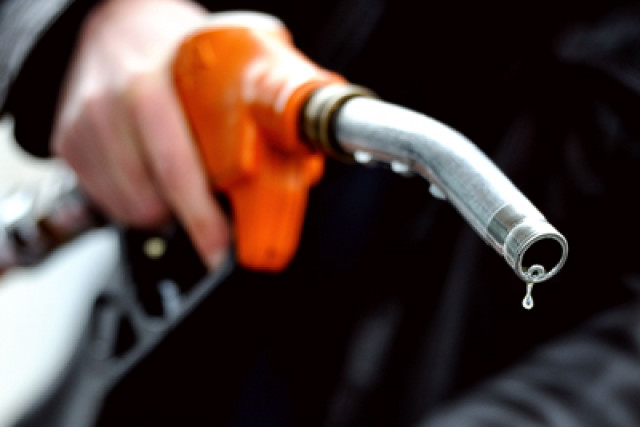Fuel in Pakistan is cheap, but for how long?
Authorities are taking a hit on tax collection in bid to remain popular

PHOTO: BRECORDER
This doesn’t appear to be the case here.
In the last few years, Pakistan has introduced an improved quality of fuel, but still sells it at cheap rates, one of the lowest in the region.
The upcoming general elections need to be credited as the PML-N finds it favourable to keep prices low, which in turn helps it not only retain its vote bank, but also keep inflationary numbers in check. Thus, interest rates have remained at a historic low, incentivising private sector credit offtake to spur economic growth. It has all worked too well.
Govt to lift ban on imported fuel-based power plants
Nevertheless, it has come at a hefty cost.
“Pakistan ranks 32 out of 170 countries (1 being the lowest) in terms of gasoline prices,” the central bank said in its latest report on the ‘State of the Economy’.
“Lately, the government has started passing on some of the impact, but this has a political economy dimension: with general elections in 2018,” the State Bank of Pakistan (SBP) added.
There is no doubt that crude oil prices have collapsed in the last few years and it went in the favour of countries that were net importers. Pakistan is one of them.
But prices hiked 64% during February 2016 to March 2017 in the international market, but Pakistan only saw a 2.3% increase during the period, suggesting one of two scenarios; either the country did not decrease them as much as it should have earlier, or that the government absorbed the price increase and caused a loss to the national exchequer.
To be fair, it is a bit of both.
According to the SBP report, Pakistan underwent the lowest price increase during the period.
Meanwhile, India increased the price by 22.7%, while other oil importing nations hiked the price in the range of 9.4% to 40.1%, the report added.
Economy of oil
Oil is not an ordinary commodity for Pakistan. It is the lifeline for all industries, commercial hubs and the public.
The country has a history of having a hefty import bill when it comes to oil.
Around three-fourths of the country’s needs are met through imports. Dependence on imported fuel has only increased in recent months following the introduction of better quality motor gasoline (RON 92 replaced RON 87) in November 2016 and diesel (of low sulphur content of 500ppm from 5,000ppm) in January 2017. Most local refineries did not produce such high quality fuels until recently and needed heavy investment for the upgrade.
Coming back to details; import of fuel made up one-fourth of the country’s total import bill in the outgoing fiscal year. Hence, a slight up and down in prices has a major trickledown effect on the economy.
Maintaining low prices
This has helped the government temper inflationary numbers as well.
“While the motor fuel index carries a relatively small weight of 3.03% in the country’s CPI basket [inflation index], its actual impact on inflation is larger due to second-round impacts [like the cost of goods transportation],” the central bank said in the report.
Therefore, maintaining low oil prices has kept the inflation at 4.18% in the first 11 months of the fiscal year.
Had the government passed on a larger increase, inflation would have been much higher as well. Electricity tariff would then have increased as well.
But if oil prices had been higher, the government would have collected higher tax revenues and come closer to meeting its tax collection target for fiscal year 2016-17.
So is a price hike on the cards?
The new government (provided that a new one comes into power) is likely to increase petrol prices in a bid to correct economic numbers and, more importantly, to criticise the previous political party.
“In the bigger picture, it appears that the impact of quality upgrades on domestic prices is yet to materialise,” the SBP said.
While consumers will derive benefits from this upgrade – including better engine performance of vehicles and reduced ‘knocking’ – the shift also entails a higher cost, which may ultimately put upward pressure on prices, it said.
The government has passed on the increase in global oil prices only gradually (and partially) from January 2017 onwards, which has been helpful in diluting the second-round impact of rising fuel prices and taming inflation expectations of domestic consumers. “However, going forward, recent regulatory changes in the motor fuel industry may lead to important adjustments in retail prices,” it said.
With Thar coal project, Pakistan is harnessing the dirtiest energy
The PML-N may very well keep petrol prices tamed for the time being, but low tax collection will tempt it to increase rates soon. But with general elections around the corner and political pressure piling up, it has chosen to ignore market dynamics.
For now, Pakistan can reap the benefits of low oil prices. But it will all come at a cost.
The writer is a staff correspondent
Published in The Express Tribune, July 3rd, 2017.
Like Business on Facebook, follow @TribuneBiz on Twitter to stay informed and join in the conversation.



















COMMENTS
Comments are moderated and generally will be posted if they are on-topic and not abusive.
For more information, please see our Comments FAQ